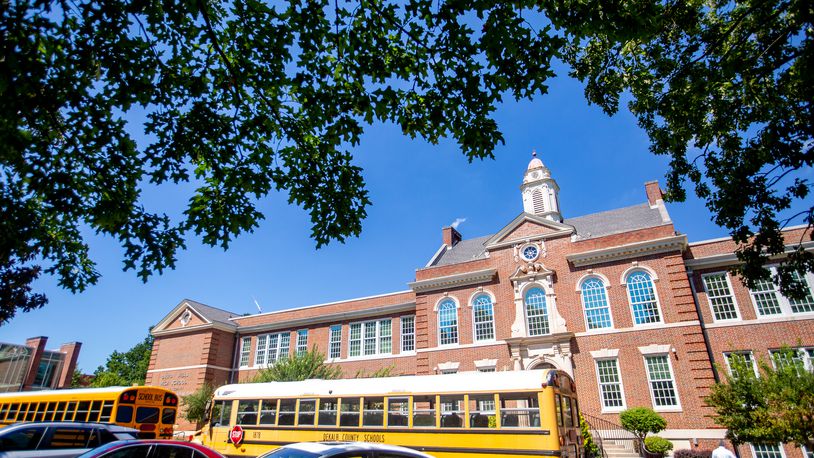
Druid Hills High renovations are slated for funding from the DeKalb County School District’s special sales tax for education. But the school board has yet to vote on a plan to spend the extra funding. (Jenni Girtman for The Atlanta Journal-Constitution)
By Cassidy Alexander
The DeKalb County School District began collecting an extra penny sales tax in July, after voters approved its renewal last year. Over the next five years, the tax is projected to bring in $700 million.
Now it’s December, and the school board still hasn’t approved a plan for how it will spend the money.
The education special purpose local option sales tax, or E-SPLOST, funds capital improvements like new construction and technology upgrades. Voters in DeKalb have approved an additional penny sales tax every five years since 1997 — most recently in November 2021, based on a tentative list of “proposed” projects.
“It’s been six months,” said Wendy Wheeler-Drew, a DeKalb parent, at a December board meeting. “Nothing can happen without your action: to name these E-SPLOST VI funded projects.”
The board was poised to vote in August on a partial list of projects it would complete with the new funding, but board members had questions and wanted to see the list expanded. For example, the board has long intended to build a new Dresden Elementary School, but the project was not on the initial list. The vote was postponed indefinitely. The list does not guarantee a timeline for the projects, but it is required for the district to begin working on projects funded by E-SPLOST VI. There is no timeline to approve a list.
The partial list included three major projects: the modernization of Druid Hills High, a new Sequoyah Middle and Sequoyah High and a new Cross Keys Middle.
At that meeting, board members questioned why projects it had initiated in previous years were not on the list, and pointed out discrepancies with the costs associated with some projects. It’s a process board member Anna Hill said had “somehow gotten off the rails.”
“The will of the board seems to have gotten lost or ignored in the process, which is why we have the situation we’re in,” Hill said. “These are really big, important decisions — which is why it’s so incredibly frustrating.”
School board Chairwoman Vickie Turner said the board will vote on the list at a special meeting in December, or at its regular January meeting.
“I think in this instance it’s prudent that we have waited,” Turner said. “I do believe that the goal of the board, the will of the board, is to finish what we started, in a way that brings integrity and fiscal responsibility.”
Since July, the latest iteration of the sales tax has brought in roughly $50 million, per state reporting.
Typically, the district waits until all or most of the money for a project has been accrued before beginning work. That’s why some projects from E-SPLOST V or E-SPLOST IV are not yet completed.
To come up with a list of projects to spend the sales tax money on, district staff must reconcile what projects board members have said they want to prioritize, what the needs are at individual schools, what upgrades have already been completed and what was outlined in the district’s comprehensive master plan.
Facilities have been a point of contention for the district for the past year. The state intervened and threatened to withhold funding if poor conditions at Druid Hills High weren’t fixed. Facilities problems were one of the reasons board members gave for voting to fire Cheryl Watson-Harris from her role as superintendent. Now, addressing facilities and maintenance problems is one of interim Superintendent Vasanne Tinsley’s primary goals.
The board also voted in December to hire an outside auditor to evaluate how it spent its sales tax money over the past 10 years. District officials expect the audit to take up to six months to complete.
Read the original story AJC.com.











